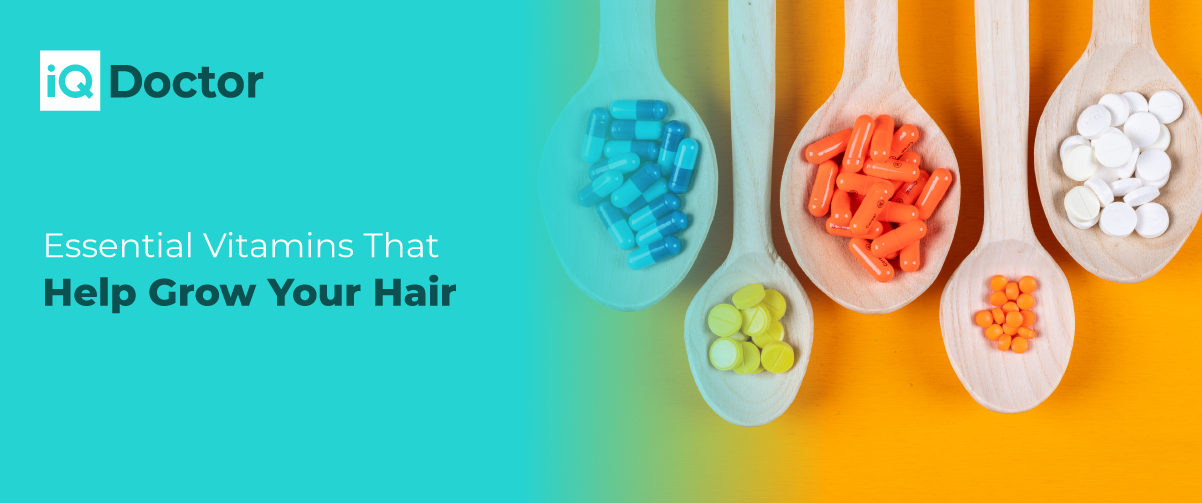Essential Vitamins That Help Grow Your Hair
05 July, 2022 | Holy Winter - Healthcare Writer

Hair loss is a serious condition which affects men and women all over the world. Facing hair loss can have a lot of negative consequences on one’s self-esteem and confidence. It is hard to remain cheerful when you have all your hair falling off your head. For many people, hair loss is genetic, which means little can be done to combat it unless you are willing to opt for hair replacement surgery. However, there are other more common reasons for hair loss. These generally tend to stress and allergy, but vitamin deficiencies cause hair loss as well. Fortunately, these can be treated with medications and diet.
Before you seek out the right vitamins for hair growth, it is best to keep some things in mind. There is no magic cure for hair loss. Medications and diet supplements such as vitamins for hair loss can take time and patience. Furthermore, certain types of hair loss, such as male pattern baldness, cannot be entirely reversed even with the best foods.
Let us look into some of the common reasons for hair loss to establish what is curable with vitamin supplements.
Common Causes For Hair Loss
Hair loss can be caused due to a range of multiple issues, ranging from genetic and medical to autoimmune issues.
Genetic Causes
Androgenetic alopecia or commonly known as male pattern hair loss, can begin at any time after puberty. Since it is genetic, male pattern baldness treatments are not a viable option. Vitamin supplements are also not very effective against it. However, some medications like Finasteride and Propecia have been known to decrease this hair loss and promote new hair to grow. In most cases, the best option is to opt for surgery.
Medical Issues
This particular type of hair loss is often caused by some medical issue. These can include childbirth, thyroid issues or undergoing major surgery. Telogen Effluvium causes many hair follicles to halt during their growing phase. Hair follicles fall more frequently than new hair follicles to begin their growth. It can also be caused by nutrient deficiencies. This is why vitamins here can be a good option. This would require you to get yourself tested to determine the vitamin deficiency, followed by a doctor’s prescription for the vitamin supplements.
Autoimmune Disorder
Alopecia Areata (AA) is an autoimmune disorder in which the individual's own body attacks healthy tissues, including hair follicles. This causes hair to fall out and prevents new hair from growing. Alopecia Areata is often cured by prescribing drugs which suppress the immune system. Although hair loss caused by autoimmune disorders is usually unaffected by vitamins, some research suggests supplementing with vitamins for hair growth may be beneficial.
A study published in 2017 reviewed patients diagnosed with AA. The study found that vitamin D, zinc, and folate levels were lower in patients with alopecia than they were in those without alopecia. It is important to note that several studies did not find a correlation between vitamin D levels and the extent of hair loss, number of patches, disease duration, and nail involvement. Moreover, data regarding vitamin D levels among both men and women with AA have been inconclusive. The study itself highlighted that there is a need for further research to be conducted in this area, as the current body of literature largely consists of small case-control studies and case reports.
Diet and Hair Loss
Although many companies do market vitamins for hair loss in women and men, these products generally do not have much scientific backing. Vitamin supplements do not work unless one has a deficiency, and most people do not have it. However, in the event you do have a deficiency, vitamin supplements can be a good way to stop hair loss.
Vitamin A
Vitamin A works toward regulating retinoic acid, which helps in keeping the scalp moisturised and preventing dandruff. It helps not only promote hair growth but also keep your hair healthy overall. Taking care of your scalp is one of the first steps in minimising hair loss.
Foods that are rich in vitamin A:
Spinach
Kidney beans
Fortified cereals
Eggs
Sweet potatoes
Carrots
Mangoes
Vitamin B5
Vitamin B5 works in conjunction with other nutrients to rebuild the damage caused by environmental factors. Blow Drying, curling and other hair treatments can seriously damage our hair. Many people also tend to over-shampoo their hair or spend a lot of time in the sun.
Foods that are rich in Vitamin B5:
Beef
Chicken
Eggs
Avocados
Whole grains
Nuts
Mushrooms
Legumes
Vitamin B12
Although very little research exists linking Vitamin B12 and hair loss, this vitamin still plays a vital role in cell division, red blood cell production, and metabolism. This is why it can promote hair growth.
Foods that are rich in Vitamin B12:
Fortified non-dairy milk.
Fortified cereal or nutritional yeast,
Beef
Tuna
trout
Salmon
Lamb's liver
Clams
Sardines
Biotin
Biotin may be considered the most beneficial vitamin for hair growth. Biotin strengthens your body's keratin, i.e. the protein your hair and nails are made of. Biotin can help improve hair follicles and strengthen individual hair shafts.
Foods that are rich in Biotin:
Mushrooms
Legumes
Brewer's yeast
Sardines
Cauliflower
Bananas
Liver
Nuts
Eggs
Vitamin C
Vitamin C is a known antioxidant and fights off factors that can damage our hair. Furthermore, it promotes the development of collagen. This is a protein found in connective tissues such as our skin. Thus vitamin C supplementation can help improve the skin on our scalps.
Foods that are rich in Vitamin C:
Broccoli
Kiwi
Guava
Strawberries
Kale
Oranges
Bell peppers
Vitamin D
Vitamin D deficiency has been well researched in alopecia and topical treatments. Vitamin D has helped many people fight hair loss, and it is extremely easy to access. Just fifteen minutes of sunshine a day helps the body synthesise vitamin D.
Foods that are rich in Vitamin D:
Milk
Eggs
Mushrooms
Salmon and other fatty fish
Cod liver oil
A healthy diet can make a big difference in reducing hair loss. A nutritional deficiency can be made up through Vitamin supplements. However, persistent serious hair loss may need medical attention. Science has come a long way, and today we have medications that can help with hair loss. To get suitable medication and a comprehensive treatment plan, you should first see your physician. Finasteride and Propecia are some of the most common and effective hair loss medications that are prescribed to people. Finasteride for hair loss is a particularly tried and tested solution. If you are wondering where to buy finasteride, IQ Doctor is the place for you.
IQ Doctor
IQ Doctor is a UK pharmacy fully licensed by the Medicines and Healthcare products Regulatory Agency (MHRA) to sell medicines online. We offer our customers a wide variety of hair loss medications, and you can visit our website for a free consultation with a medical professional to determine suitable options. Once you place your order, the medication will reach your doorstep in a quick time.
Reviewed By

Omar El-Gohary
The superintendent and lead pharmacist - registration number 2059792.
Omar is passionate about developing healthcare technology to empower our patients.

